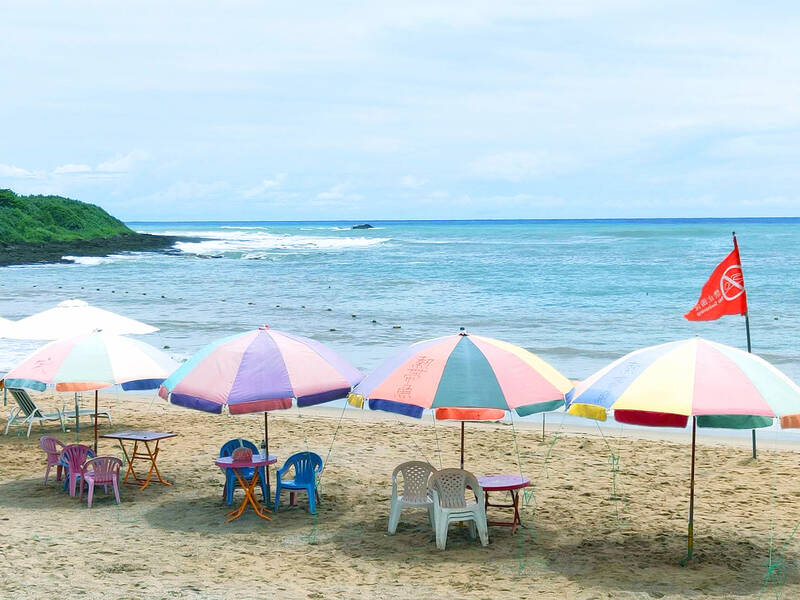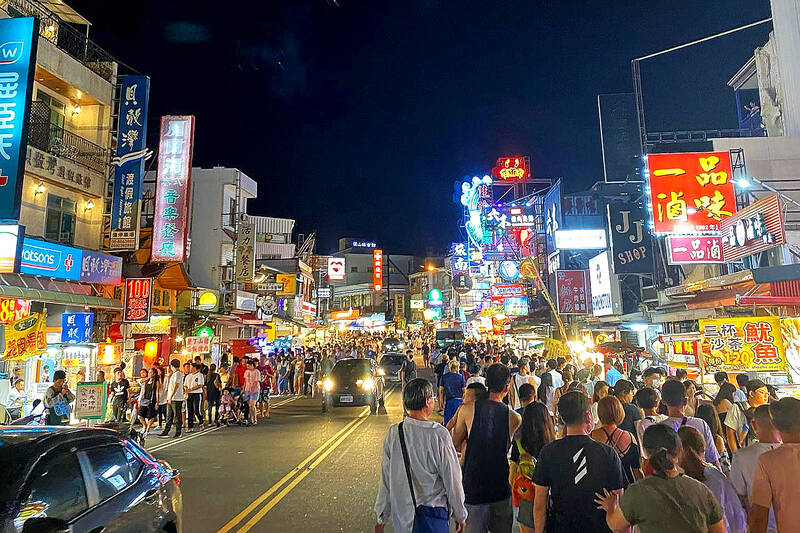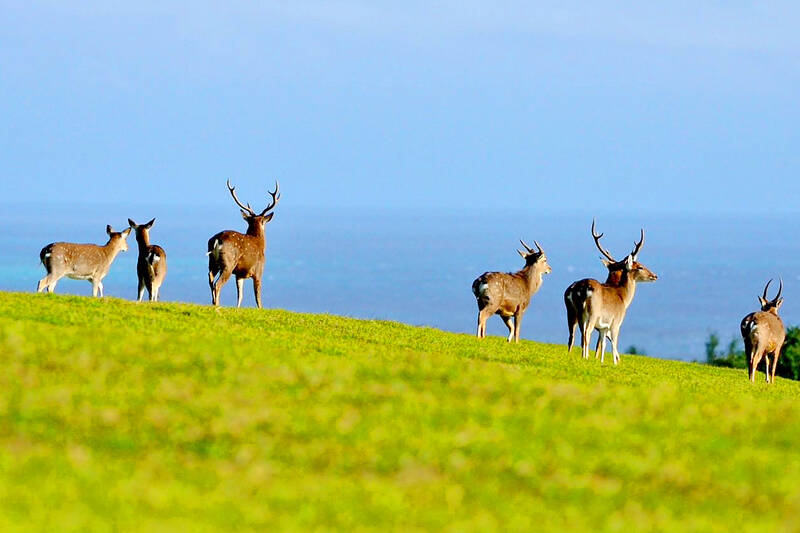Two years ago my wife and I went to Orchid Island off Taitung for a few days vacation. We were shocked to realize that for what it cost us, we could have done a bike vacation in Borneo for a week or two, or taken another trip to the Philippines. Indeed, most of the places we could have gone for that vacation in neighboring countries offer a much better experience than Taiwan at a much lower price. Hence, the recent news showing that tourist visits to Pingtung County’s Kenting, long in decline, reached a 27 year low this summer came as a shock to few of us living here.
Like many domestic travelers I have curtailed my trips around the island because of rising hotel costs. News reports suggest this complaint is common. A press release from the tourism authorities last month showed that average daily rates at licensed hotels had risen 14 percent in a year, continuing a trend. The Tourism Bureau has blamed inflation for the increases. It also noted that hotel occupancy rates have recovered their pre-COVID numbers.
MARKETING FAILURE

Photo: Tsai Tsung-hsien, Taipei Times
The slumping numbers for Kenting epitomize the catastrophic failure of the tourism authorities to promote Taiwan. In the minds of most visitors, Kenting is associated with the beach and the famous night market on Kenting high street (墾丁大街), and the activities available there. I have never seen promotion of the peninsula’s wealth of historical resources, from the city walls of Hengchun Township (恆春) to the site of the Rover expedition’s defeat, to the Mudan Incident (牡丹社事件) and the tombs of the Okinawan sailors.
“Hopefully the government will consider greater development of trails, historical markers and history education in both English and Chinese so visitors can get a sense of the rich history of the area. An annual re-enactment might be a good tourist draw as well.”
I wrote those words in 2011 after the Pingtung County government paid me to take a vacation in the county. Years have passed, and I am still waiting.

Photo: Tsai Tsung-hsien, Taipei Times
The area’s nature resources are also seldom acknowledged. How many of my readers have ever heard of Nanren Lake (南仁湖), a nature reserve a few kilometers north of Manjhou Township (滿州鄉) with 10 kilometers of trails? How many know the north side of the peninsula boasts two hot springs sites? How many know how lovely and unspoiled roads like the 200, the 199 and the 26 are, perfect for biking and scootering?
One year, outside of the tiny port of Gangzai Village (港仔村) on the east coast, I biked into a group of deer. Nearby are sand dunes which are locally promoted for ATV experiences, but the area around Gangzai is never promoted. Kenting’s problems in part reflect the large gaps in the marketing of the island’s tourism sites. No wonder news reports remark that foreign tourists, whose numbers have allegedly recovered (data from last year shows tourist numbers still 45 percent below their 2019 levels), seldom leave Taipei and its environs.
POOR HOTEL EXPERIENCE

Photo: Tsai Tsung-hsien, Taipei Times
Often lost in this discussion is that not only have hotels become more expensive, but the affordable hotel experience itself has declined. More and more I find myself booking rooms only to find that everything is automated and no human is to be found. Though I have to check myself in and out, communicating with the owner online, I save no money. Another growing feature is the lack of basic amenities such as bars of soap and razors. Hoteliers often say that not providing these is “eco,” but it often looks like they are simply saving a few pennies by skimping on service. Ordinary locals thus experience paying more and getting less.
The Tourism Administration reported last month that high-end hotels in Nantou County now cost over NT$15,000 a night on average. For that sum, one can book a ticket to Bangkok, Calcutta or even further abroad.
In Yilan County, general hotels are the most expensive with average costs of NT$3,400 a night, roughly the price of a one-way ticket on a cut-rate airline to a major beach resort like Boracay in the Philippines or a major tourist destination like Ho Chi Minh city in Vietnam.
HIGH-END TOURISTS
Perhaps the inexorable trends of domestic population decline and rising prices will eventually solve the hotel industry’s labor shortage, by wiping out a substantial portion of local firms in this sector. Until then, the government has responded to the industry’s problems with its “Taiwan — Waves of Wonder” campaign, which is aimed at high-end tourists, who are supposed to “Enjoy the Mountains, Embrace the Sea and Explore the Island.”
As if the government does much to promote either of the first two items in that list! That program is another example of the government’s usual solution strategy — if something isn’t working as hoped for, address the issue by increasing the status of the program, as it does with its faux immigration program, the Gold Card program, or the ridiculous gourmet dining train Taiwan Railways premiered in 2022.
The promotion of high-end tourism is in part making a virtue of a necessity. Taiwan must cater to higher-end tourists, because everything here is expensive. Budget tourism here is difficult. Numbers vary, but on average, daily tourist expenditure is usually said to lie between US$170-200, US$60 of which goes to accommodation. Airline tickets to Taiwan are relatively expensive as well. Though the budget market is huge, tourism authorities, chasing status and high-end spending, continue to spurn it. The government also has a local campaign, the “Smile South Taiwan,” to attract northern visitors to the south.
Ironically, despite the perception among industry observers and locals that Taiwan’s rising hotel prices make it a poor value for money compared to competing southeast Asian destinations, government surveys and scholarly research both show high satisfaction with the Taiwan tourist experience. Obviously international tourists come here expecting to pay more and feel they are getting good value for the money, while domestic tourists still remember the low hotel prices of decades ago.
The government’s goal for this year was 12 million tourists, essentially doubling last year’s figure. Without the return of tour groups from the People’s Republic of China (PRC), essentially a subsidy program designed to keep the hotel industry afloat, this goal will be difficult to reach. Total visitor arrivals have been under 620,000 each month this year save for March, when they topped 800,000.
The brutal truth is that as long as Taiwan fails to find ways to access the budget market, it will not be able to raise these numbers. For a nation dependent on the goodwill of outsiders for its independent existence, this failure has implications that go well beyond the hotel industry.
Notes from Central Taiwan is a column written by long-term resident Michael Turton, who provides incisive commentary informed by three decades of living in and writing about his adoptive country. The views expressed here are his own.

May 18 to May 24 Pastor Yang Hsu’s (楊煦) congregation was shocked upon seeing the land he chose to build his orphanage. It was surrounded by mountains on three sides, and the only way to access it was to cross a river by foot. The soil was poor due to runoff, and large rocks strewn across the plot prevented much from growing. In addition, there was no running water or electricity. But it was all Yang could afford. He and his Indigenous Atayal wife Lin Feng-ying (林鳳英) had already been caring for 24 orphans in their home, and they were in

On May 2, Chinese Nationalist Party (KMT) Chairman Eric Chu (朱立倫), at a meeting in support of Taipei city councilors at party headquarters, compared President William Lai (賴清德) to Hitler. Chu claimed that unlike any other democracy worldwide in history, no other leader was rooting out opposing parties like Lai and the Democratic Progressive Party (DPP). That his statements are wildly inaccurate was not the point. It was a rallying cry, not a history lesson. This was intentional to provoke the international diplomatic community into a response, which was promptly provided. Both the German and Israeli offices issued statements on Facebook

Even by the standards of Ukraine’s International Legion, which comprises volunteers from over 55 countries, Han has an unusual backstory. Born in Taichung, he grew up in Costa Rica — then one of Taiwan’s diplomatic allies — where a relative worked for the embassy. After attending an American international high school in San Jose, Costa Rica’s capital, Han — who prefers to use only his given name for OPSEC (operations security) reasons — moved to the US in his teens. He attended Penn State University before returning to Taiwan to work in the semiconductor industry in Kaohsiung, where he

Australia’s ABC last week published a piece on the recall campaign. The article emphasized the divisions in Taiwanese society and blamed the recall for worsening them. It quotes a supporter of the Taiwan People’s Party (TPP) as saying “I’m 43 years old, born and raised here, and I’ve never seen the country this divided in my entire life.” Apparently, as an adult, she slept through the post-election violence in 2000 and 2004 by the Chinese Nationalist Party (KMT), the veiled coup threats by the military when Chen Shui-bian (陳水扁) became president, the 2006 Red Shirt protests against him ginned up by